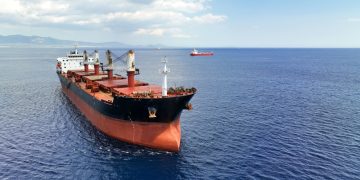In an exclusive interview to SAFETY4SEA, Mr. Jacob Damgaard, Associate Director, Loss Prevention, Britannia P&I, highlights that only with close cooperation across industry stakeholders, the maritime industry will move forward.
Crew welfare and setting ambitious environmental targets should be high on the agenda for 2022 as the time to address the challenges of climate change is ticking and crews need to remain safe, secure and healthy and happy in these challenging times.
SAFETY4SEA: From your perspective, what are the key challenges that the maritime industry is currently facing? What are your suggestions to move forward?
Jacob Damgaard: I believe the pandemic will continue to be the most dominant factor impacting not just shipping but economies and societies across the entire world in 2022. The scale of the challenge will depend on how the pandemic evolves and what influence the discovery of Omicron, and potentially other variants, may have. If the new variants prove to be more contagious than the Delta variant, then this is likely to have an impact on the ports where crew can be relieved and ships may be required to quarantine before being allowed alongside which will cause further delays and disruption to the world’s supply chains, as well as providing issues with crew changes and trip length, which is an ongoing issue leading to safety concerns. Furthermore, to set common goals in a sector as global as shipping when it comes to agreeing on environmental targets has proven difficult and the level of ambition varies across the different regions and sectors within the industry. Setting ambitious environmental targets will also be on the agenda for 2022 as the time to address the challenges of climate change is ticking and customer demand for emissions-free transport is only likely to increase. We published our first Britannia Sustainability Report in July last year, which outlines how we are embedding the management of climate related risk into our business strategy and integrating sustainability into our core processes. For both of these issues close cooperation across the industry is essential to achieve both agreement on sustainability goals and approaches and to gain acknowledgement and understanding for our industry and seafarers in terms of the many restrictions currently imposed on them.
S4S: What lessons has the industry learned with the pandemic? Where should we improve for a future crisis situation?
J.D.: I think the industry has learned that despite shipping transporting about 90% of the world’s trade, and thereby providing an absolutely vital supply line for consumers, the maritime industry remains unfamiliar to most. The importance of seafarers and their welfare are not really considered as most consumers take it for granted to visit their local supermarket and find the products they want without thinking of how these items reached the shelves. The Ever Given incident in the Suez Canal briefly highlighted to the outside world the importance of shipping when it comes to world trade. Obviously we want to avoid further incidents like the Ever Given, but campaigns to raise awareness of our industry and seafarers are required to gain the acknowledgement they deserve.
S4S: In your view, has the industry been successful in enhancing its safety performance? Where should ship operators focus on to further enhance safety culture onboard?
J.D.: The introduction of the ISM code in the mid-90s marked a change in the industry and moved safety to the top of the agenda. In general, I believe the ISM code has had a positive impact and helped the industry enhance its safety performance. However, it is important that the focus on safety remains and with the significant environmental challenges to be addressed and investment required as part of the industry’s decarbonisation process, it is important that safety does not fall out of the spotlight. To improve the safety culture I recommend avoiding micro managing the crew and instead to provide the crew with more say in terms of the company’s Safety Management System. This will encourage more ownership of safety issues among the crew and make them feel a part of the system and able to make a difference.
S4S: Are you satisfied with industry stakeholders’ response on the issue of crew welfare until today? What are your suggestions to move forward?
J.D.: Crew welfare is vitally important and the industry needs to work together to ensure crews remain safe, secure and healthy and happy in these challenging times
S4S: What is your wish list for the industry and/or regulators and all parties involved towards loss prevention?
J.D.: In recent years there seems to have been a trend towards countries implementing stricter and varying national regulations than those stipulated by the International Maritime Organisation. This is an unfortunate trend as operating ships becomes increasingly more difficult when different countries impose different legislation on the same issue. Transparency is required when operating in a global industry like shipping and mandatory requirements should be agreed via international forums and be consistent.
S4S: How is the Britannia P&I Club facing the most challenging issues of digitization and decarbonization? Are there any related initiatives / projects / actions planned?
J.D.: Britannia P&I keeps abreast of the latest industry developments, not just in terms of digitalisation and decarbonisation, but across a range of issues that might also become challenges for the industry in the future. We will provide our Members with relevant information and the latest developments on a range of topics via our website, regular Members’ newsletters and via social media, and where we can share any lessons learned. We also commission further research from time to time, addressing issues that we consider challenges or potential areas of claims concern, in order to gain additional knowledge and insights which could benefit our membership, and the industry at large. Our award winning BSafe campaign which has been running throughout 2021 and may be accessed via our website specifically addresses cyber security, as this is recognised as an emerging risk due to the increased use of digital solutions within the industry.
S4S: Considering the ongoing humanitarian crisis (due to the pandemic) and recent accidents (i.e. Ever Given), how may the young generation think of the shipping industry? How should we work to raise industry’s profile to the next talents?
J.D.: As discussed above I think the shipping industry and its importance for world trade is not something many young people are aware of or give much thought. The vast media attention around the Ever Given will have raised awareness of the important role of the industry, but that may already be slipping from people’s memories. Shipping needs to be able to promote itself more effectively and reach out to younger people. However, some countries have been very successful in recruiting young shipping talents through dedicated campaigns, while the fact that it is a global industry will also appeal to many young people. It is an ongoing challenge to educate those not in the industry as to its importance, because it is often a case of “out of sight, out of mind”.
S4S: If you could change one thing across the industry from your perspective, what this would be and why?
J.D.: As mentioned, I would like to see greater collaboration across the industry to better support the welfare of crews. The safety, security and wellbeing of crews is vital at any time, but it is particularly important in these challenging times we’re living through.
S4S: Do you have any plans / projects / initiatives to support innovation within shipping that you would like to share?
J.D.: The aim of our BSafe campaign is to promote best practice around onboard safety and security, and through the use of case studies and other reflective learning materials, share useful lessons learned to our Members’ onboard crew, as well as shore based managers. Furthermore, Britannia P&I is involved in various projects with the aim of providing new knowledge and insights to our Membership and the industry at large on innovative ways of thinking in order to mitigate and reduce losses.
S4S: What is your key message to industry stakeholders in order to enhance crew motivation and competence during these challenging times?
J.D.: To see your employees both on board and on shore as an asset and protect, support and develop them as such. The crew are the often underappreciated piece of the shipping jigsaw, they need to be considered at all times and their interests protected. Without the crews, we have no shipping industry. With increasing levels of digitalisation and decarbonisation, ships will become more complex and high levels of education and training will be required to operate them safely.
The views presented are only those of the author and do not necessarily reflect those of SAFETY4SEA and are for information sharing and discussion purposes only.


































































